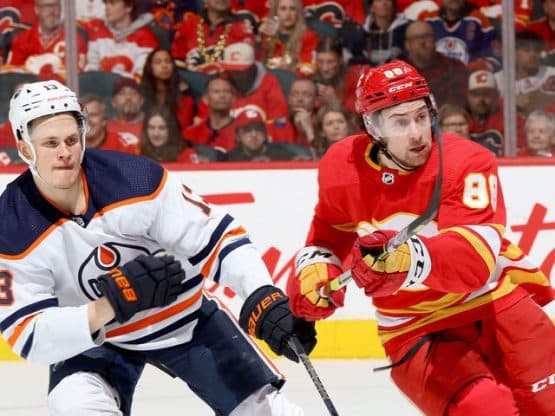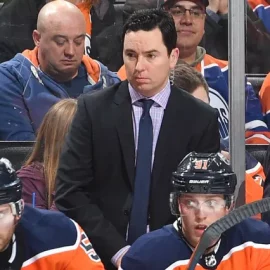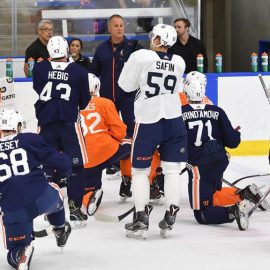The fifth game in our officiating review series is one that many would probably rather forget. The April 2nd game against the Flames, a 5-0 embarrassment for the home team. That evening Brad Meier and Evgeny Romasko were the officials. The most targeted players for both teams were Matt Hendricks for the Oilers and TJ Brodie for the Flames.
At the bottom of the article you will find links to previous games as well as the raw data from this game.
The Oilers took 6 penalties in this game to the Flames’ 2, yet the uncalled infractions were 15 by the Oilers to 33 by the Flames, throwing our assumptions about an evening up of the penalties by the game officials out the window.
The Flames’ only two penalties were on what I’ve categorized as obvious technical infractions, tripping and hooking calls on Eberle and Nugent-Hopkins, respectively. By contrast, of the 6 Oiler penalties only 3 were rated as being “fair” or worthwhile penalties, one of them being a bench minor. The remaining 3 were rated as either marginal or what we would otherwise call “weak” penalties or fantasy, or a “phantom” call.
It should be noted that the Oilers took three penalties in the 2nd period as the game began to slip away and they began to undoubtedly feel the pressure of the final Battle of Alberta game in Rexall Place/Northlands Coliseum. While the decisions made by the officials does bear some scrutiny, it is fair to ask to what degree the Oilers cast their own lot at this stage of the game. Overall, the Flames ‘ share of uncalled infractions is among the lowest percentage relative to the other events within the game of any of the games we have reviewed to-date, so it would not do to suggest that they played a dirtier game than any of the previous teams we’ve covered in this exercise.
That being said, let’s remove the marginal infractions and focus on technical and physical fouls to see what else we can draw out.
Okay, so about what I wrote earlier that the Flames weren’t committing fouls at a rate greater than other teams we’d looked at before…this chart is problematic. The numbers aren’t significant enough to argue a strong correlation, but the sheer ratio event here suggests that something is amiss. The Oilers were penalized on 1/3rd of their technical infractions committed while the Flames were penalized on 1/9th of theirs despite committing eight times as many technical fouls. That raises some eyebrows especially when we consider an earlier article linked above wherein former referee Kerry Fraser specifically says that officials would be acutely aware of trying to ensure that penalty calls were even in a game and the accompanying article that argues a strong case that teams receive more powerplays when they are playing from behind in a game. This game flies in the face of both claims, though we must remember that one game does not disprove these arguments entirely, but may just be an outlier.
Let’s take a breath and look at the physical fouls.
No help for us here. The Oilers once again were penalized on 1/3rd of their infractions committed while the Flames committed a greater share (nearly twice as many) and were not penalized for any of them.
Based on this information I believe we are faced with several options.
One – If we wish to ascribe to the “game management” theory of officiating, that is, that referees remain acutely aware of the penalty count to either team and work to match penalties to a more or less even state depending on the circumstances of the game, then we must accept that the application of this method failed completely and utterly in this instance.
Or
Two – If we wish to ascribe to the theory that officials are more prone to offer powerplay opportunities to teams that are playing from behind, then this game would stand in direct contradiction as the Oilers were penalized four times before receiving a powerplay in their favour, by which time they had been playing from a position of deficit for some time and were, for all intents and purposes, out of it.
The final option is that the officiating for this game was, regardless of which theory of officiating one chooses to put forth, completely inept and not in any way appropriate for a game of this significance.
We are two games removed from our final article which will examine this series of games against a contemporary series of non-Oiler games. I look forward to seeing what we manage to bring forward to that examination and what, if anything, can be discovered as a result.
Here once again is the raw data.
| Against Player | |||||||
|---|---|---|---|---|---|---|---|
| M/C | Severity | Type | EDM | CGY | Time | Goal | Injury |
| M | 2t | Hk | 14 | 19:39 | |||
| M | 1p | Sl | 82 | 19:00 | |||
| M | 2t | Hk | 4 | 18:30 | |||
| M | 2t | Hd | 44 | 17:35 | |||
| C | 3t | Tr | 14 | 16:43 | |||
| M | 1t | U Dv | $ | 16:35 | |||
| M | 2p | Sl | 2 | 13:24 | |||
| M | 1t | Hk | 7 | 12:45 | |||
| M | 2p | Sl | 7 | 12:37 | |||
| M | 1t | Tr | 11 | 12:10 | |||
| M | 2t | Int | 93 | 11:43 | |||
| M | 2t | Tr | 4 | 11:23 | |||
| M | 3t | Int | 18 | 11:04 | |||
| M | 1t | Hk | 23 | 10:23 | |||
| M | 3t | Hd | 23 | 10:01 | |||
| M | 2t | Int | 51 | 9:58 | |||
| M | 2p | R | 97 | 8:47 | |||
| M | 3t | Tr | 13 | 8:08 | |||
| M | 1t | Hd | ? | 7:10 | |||
| M | 2p | Sl | 8 | 6:21 | |||
| M | 2p | Sl | 35 | 5:10 | |||
| M | 3p | R | 18 | 5:10 | |||
| M | 3p | Sl | 97 | 4:54 | |||
| C | 1p | HS | 17 | 2:30 | |||
| M | 1t | Tr | 8 | 1:58 | |||
| M | 3t | GI | 35 | ~1:30 | |||
| M | 3t | Tr | 23 | 1:01 | |||
| M | 2t | Tr | 4 | 18:11 | |||
| M | 1t | Tr | 10 | 16:53 | |||
| M | 1p | Sl | 44 | 16:29 | |||
| M | 1p | CC | 29 | 16:09 | |||
| M | 1p | Sl | 27 | 15:38 | |||
| M | 1p | Sl | 7 | 15:23 | |||
| C | 2t | BM | $ | 14:14 | |||
| M | 1t | Int | 57 | 11:56 | |||
| C | 1t | Hk | 8 | 8:34 | |||
| M | 1p | Sl | 82 | 7:43 | |||
| M | 1t | Hk | 8 | 3:53 | |||
| C | 2p | Sl | 33 | 3:10 | |||
| M | 2t | Tr | ? | 1:49 | |||
| M | 1t | Tr | 4 | 18:36 | |||
| M | 2t | Tr | 55 | 14:14 | |||
| M | 1t | Hk | 28 | 18:00 | |||
| M | 2t | Hk | 29 | 16:00 | |||
| M | 3t | Tr | 29 | 15:58 | |||
| M | 2p | Sl | 29 | 15:29 | |||
| C | 2p | CC | 13 | 13:29 | |||
| M | 1t | Hk | 23 | 13:06 | |||
| C | 3t | Hk | 93 | 9:51 | |||
| M | 3t | Hk | 93 | 6:24 | |||
| C | 0t | Hk | 7 | 6:24 | |||
| C | M | 23 | 5:43 | ||||
| C | M | 33 | 5:43 | ||||
| M | 3p | R | 23 | 5:33 | |||
| M | 3p | R | 51 | 5:33 | |||
| M | 1t | Int | 97 | 4:44 | |||
| M | 1t | Int | 49 | 4:16 | |||
| M | 2t | Hd Stk | 29 | 3:52 | |||
| M | 3p | Sl | 79 | 3:30 |
Game one
Game two
Game three
Game four
Add The Sports Daily to your Google News Feed!














